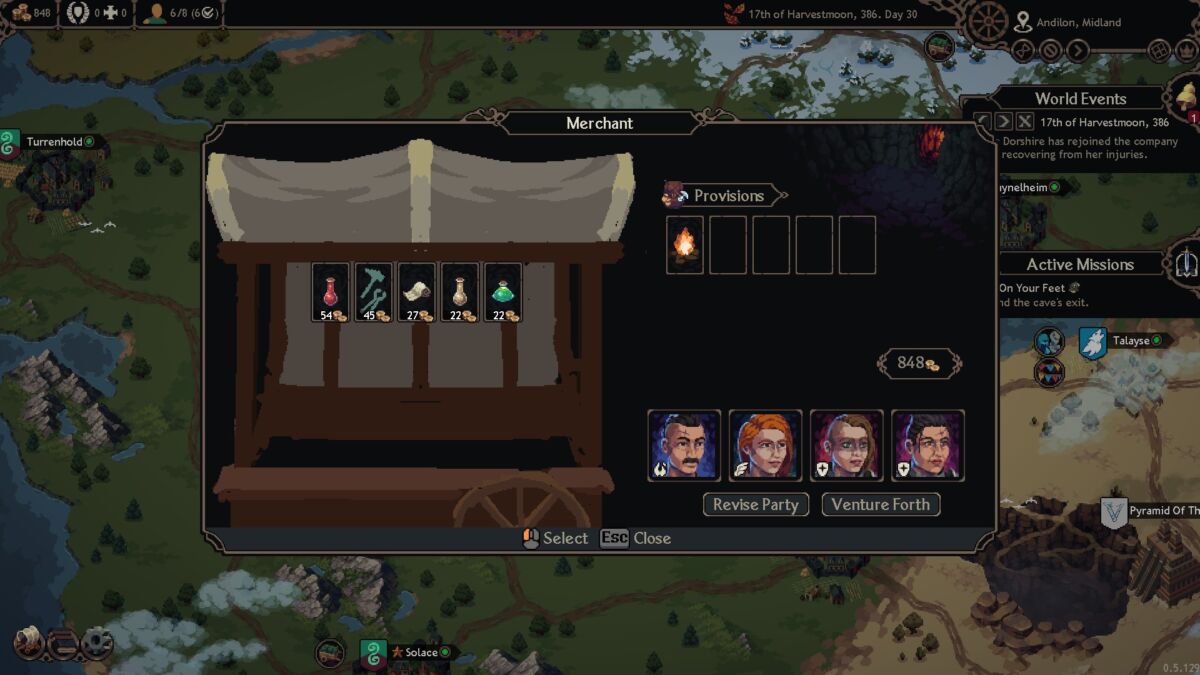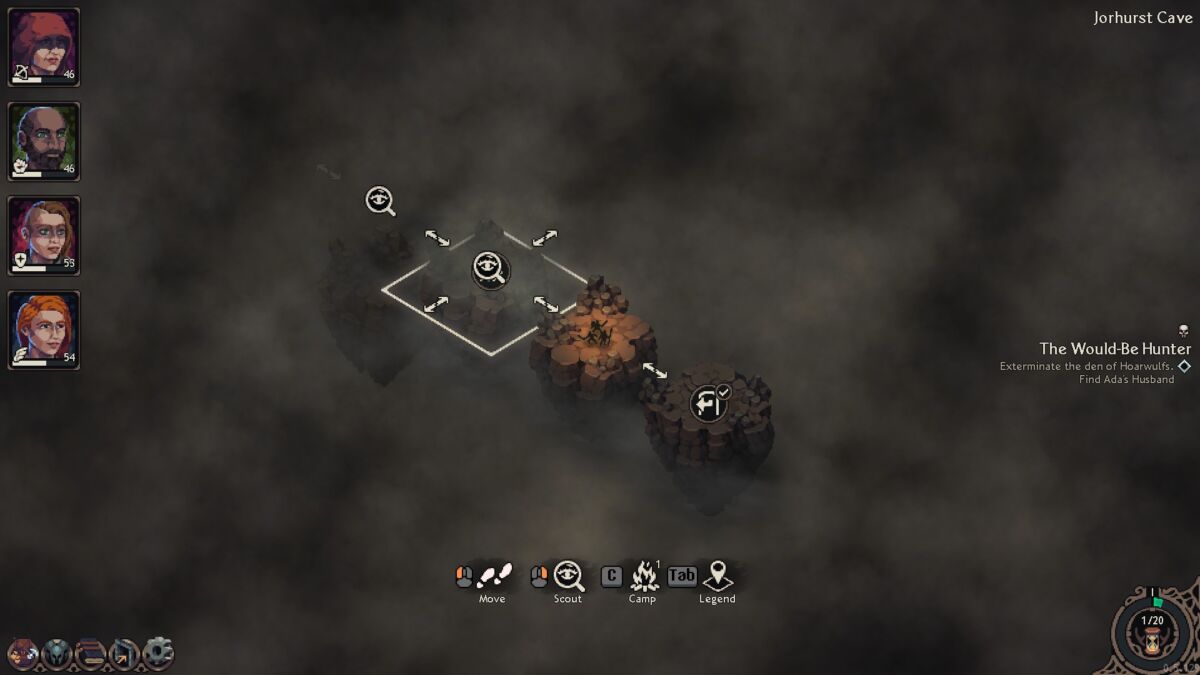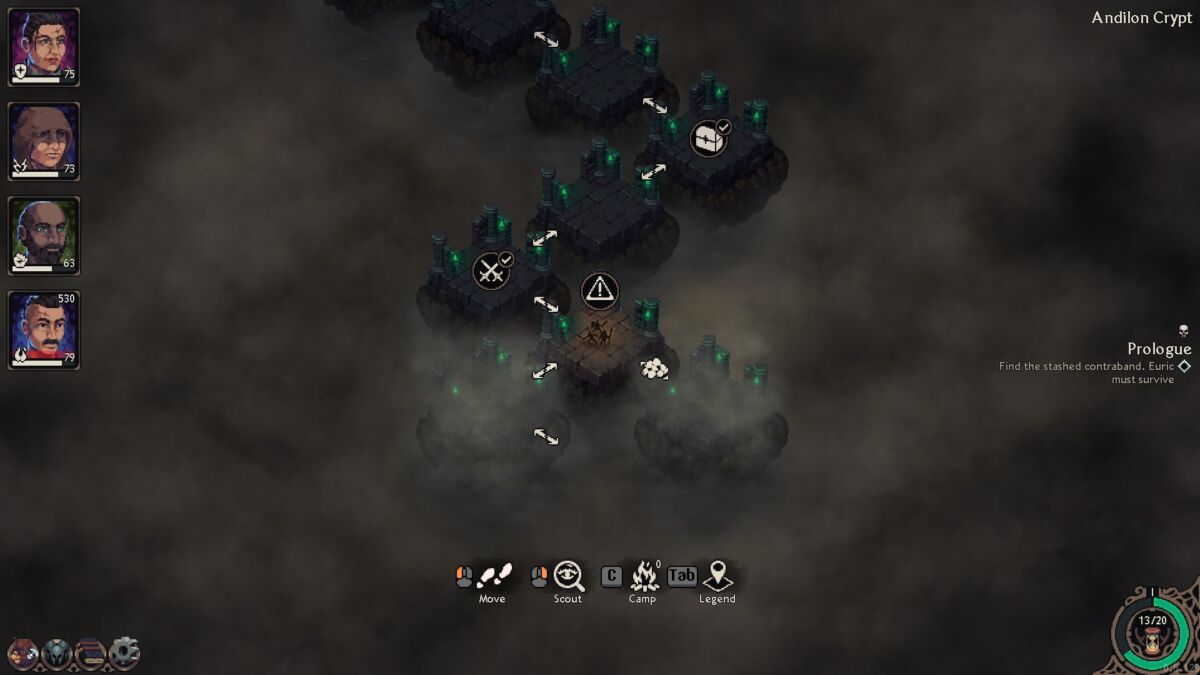It’s quite likely in The Iron Oath that you’ll find yourself clearing many dungeons, caverns, and secret locations as part of your party’s many contracts to make a living in the world of Caelum. In fact, dungeon crawling is one of the major elements of Iron Oath’s gameplay and they can be treacherous affairs, so it’s best to be prepared before heading into the unknown.
Here’s everything you should know about dungeon crawling in The Iron Oath.
The Iron Oath Dungeon Crawling Guide
Provisions

Once you’ve reached the designated contract or mission location with your company, you’ll need to compose your party that’ll venture into the maws of danger. You can choose up to four members from the company to form the core of your adventuring group.
After choosing your party members, the game will offer you a chance to purchase provisions, items, and expendable gear to take with you into the dungeon. These can be potions, bandages, tools, and other miscellaneous equipment that keep your party healthy or help solve challenges in encounters.
Provisions cost a moderate amount of gold, but all unused provisions will be partially refunded after the dungeon crawl wraps up. Also, you start with four slots for provisions and these can be increased through company upgrades as you gain more renown, progress through the narrative, and complete contracts in the world.
Actions

While exploring a dungeon, your party has four major actions they perform outside of combat: moving, scouting, camping, and accessing their inventory. The move action is the simplest in that it lets the party move from one section of the dungeon to an adjacent one. A move action costs 1 unit of time (more on that later).
The scout action allows the party to reveal the next two or three sections in a given direction, without moving the entire party. In addition to revealing upcoming sections, scouting will also reveal points of interest, possible ambushes, secrets, and other interesting locations that may be of some importance to the party. This action also costs 1 unit of time.
The camping action lets the party pause, take a breather, heal up, and prepare for the journey ahead. We’ll go into more detail regarding that later. Unlike moving and scouting, the camping action doesn’t cost time units and instead resets the time meter to 0, but doesn’t revert any effects gained from advancing time.
Finally, at any moment outside of combat, the party may utilize its inventory to use any provisions you purchased for their expedition. Using any item from the inventory will cost 1 unit of time per item used.
Time Meter

Time is a crucial resource to manage when exploring dungeons and it comes with its own prominent meter displayed in the bottom right of the screen. As the party progresses through the dungeon and performs actions, the time meter will fill up to a set maximum determined by the difficulty you chose for your playthrough.
Once the meter fills up to that threshold, the meter will advance to the next level resetting back to 0 and also incurring some kind of effect on the party – usually a negative one. Essentially, the more time the party spends in a dungeon, the more difficult and treacherous it’ll become.
Events and Encounters

As the party makes its way through the dungeon, it’s highly probable they’ll enter a location with an event or an encounter associated with it. The most common encounter is combat, where Iron Oath will switch to the turn-based tactical mode and the party will fight to defeat the enemy or be defeated themselves.
Other types of encounters the party may stumble upon include character dialogue interactions, a loot or item challenge, or some other task that may include character skill checks or a party decision. Most decisions and actions within these encounters will have variable time unit costs, so depending on the situation, consider carefully what would be most beneficial to the party and minimize any future negative effects.
Camping

The camping action requires a section in itself, due to its importance to the party’s survival and well-being. Aside from resetting the time meter back to 0, the main mechanic of camping involves the party burning incense to give party members a variety of benefits.
These can be healing party member hit points for a set percentage, increasing character morale, or even resetting ability charges for use in combat. Every incense-burning action has a primary powerful effect and a smaller secondary effect that will benefit all resting characters.
However, camping in a dungeon isn’t safe and there’s always a chance that a raider party or some other ambusher will happen upon the party’s resting place. The percentage chance of an ambush occurring is displayed at the top of the screen. If the party camp does get ambushed, all benefits and actions will be interrupted and may make the party’s stay in the dungeon even more unpleasant.
The party can deploy up to two characters to act as lookouts, which reduces the percentage chance of an ambush. Members on the lookout will only benefit from the primary effect of incense, as they’ll be too busy to benefit from secondary effects.
Dungeon crawling is a core component of any campaigning mercenary company and it’s best to be knowledgeable and prepared on what resources and tools you’ll have access to. Now that you know how the core elements of The Iron Oath work, what approach will you take in venturing into dungeons, caverns, and secret areas of Caelum?
The Iron Oath is available on PC.
READ NEXT: 10 Best Roguelike Strategy Games
Some of the coverage you find on Cultured Vultures contains affiliate links, which provide us with small commissions based on purchases made from visiting our site.

